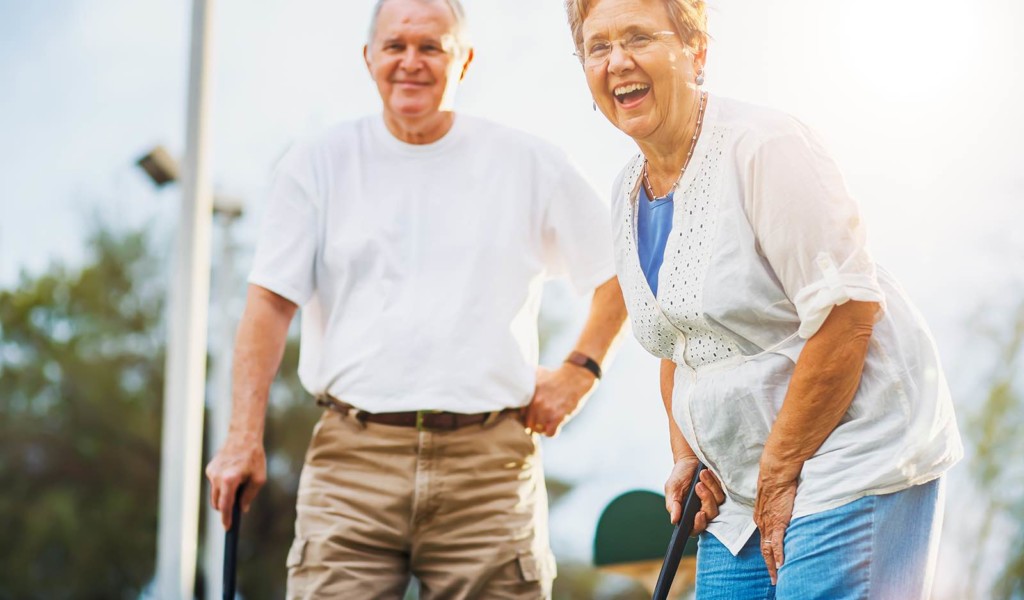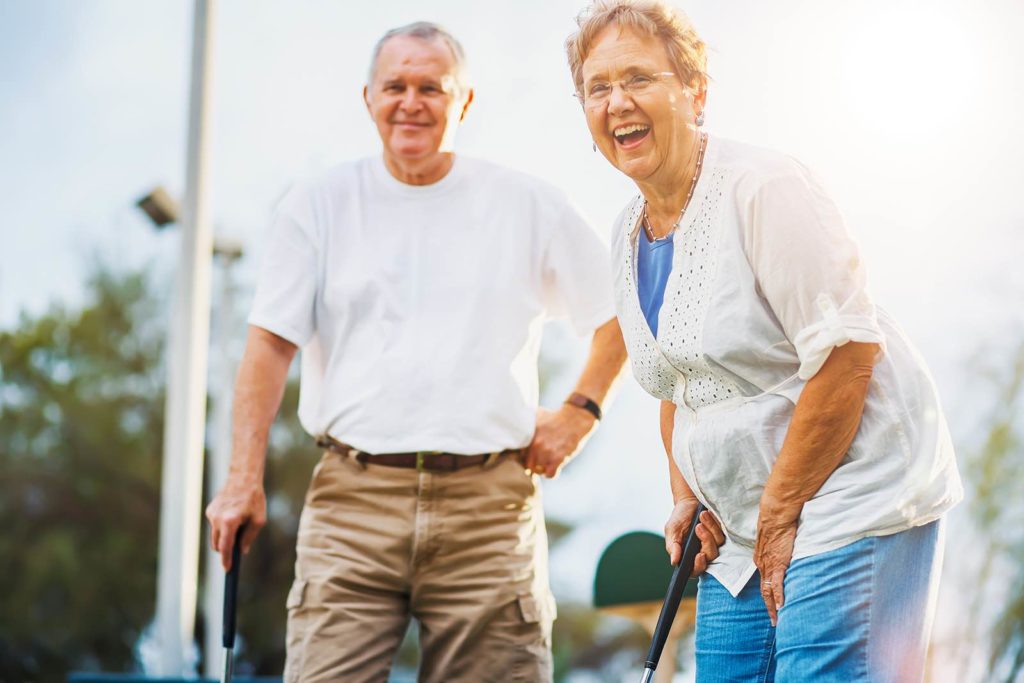Self Improvement
Communication Skills with Seniors
February 28, 2019

Improving communication skills is good for all of us who are involved with seniors, and for the seniors themselves. While much as been written about communications skills in general, this particular topic isn’t addressed as often. Some of the most common statements made by senior citizens about communication issues are:
- Please don’t yell at me, just talk a little louder and don’t mumble.
- Please don’t call me Sweetie, Sweetie Pie, Young Lady, Young Man, or any other child-like name.
- Please don’t say things that make it sound like I am about to die.
Let’s look at the three components above:
- The physical act of communication can be a barrier to a good conversation, especially for those with a hearing loss.
Per the Gerontological Society of America’s(GSA) CEO, James Appleby, “two-thirds of adults 70 and over have a hearing loss that affects their daily conversation…. Leading to isolation, depression.” Hearing loss, however, doesn’t mean yelling is the solution.
In addition to hearing aids, there are strategies to enhance communication with someone with even a slight hearing loss. A Cleveland Clinic guide to improving communications suggests the following:
- Gain attention: saying the person’s name, or giving a light touch to let the person know you are there.
- Maintain eye contact: facial expressions and body language are critical pieces of conversations.
- Avoid covering mouth: Most listeners make use of lip-reading. Covering your mouth and chewing make that difficult.
- Speak naturally: shouting is not helpful, nor is mumbling. Speak distinctly and at a normal rate. Pausing may help the person process the speech.
- Avoid background noise: turn off the TV or the radio.
One final note on the physical act of conversation, remember to talk TO the person directly. A pet peeve of seniors is hearing a visitor ask someone else “how is he or she doing”… as if the person cannot hear. Another pet phrase that is annoying, “how are WE doing.” These phrases make the person feel non-existent, versus “how are YOU doing” which makes them feel valued.
- The tone of communication can be another barrier to conversation.
Would you like to be addressed in a way that sounds patronizing, or as if you were a small, cute child? Probably not. You want to be addressed as an intelligent partner in a conversation. Seniors want to be treated the same way. Calling a senior ‘sweetie’ implies you think that person is ‘cute’ which indicates a lack of respect for the person.
Taking this a step further, the GSA has a guide to communicating with older adults, which encourages us to use the same vocabulary we use with other adults. The report says “as a general rule, older adults maintain their existing vocabulary or continue to improve it. They have no greater problem understanding complicated words than do members of other age groups, so there is no need to simplify the words you use.”
- Finally, let’s discuss the conversation itself. Sometimes we are uncomfortable with talking to seniors, as we don’t think we have much in common.
Some thoughts to consider:
- Seniors do not feel their age the way you may think they would. Let’s say you are 40, it is probably safe to say you still feel like you are 25 in your head. Seniors feel the same. A 75-year-old probably feels like a 40-year-old inside. Your conversation can and should be just like when you talk to any adult. Talk about current events, recent sports stories, etc. You ask questions, but you also let them know about you.
- Seniors do not approach each day as one more day before they die, it’s just today. Don’t ask questions or talk so it sounds like you are writing their obituary or ‘taking stock’ of their life. As an example, “what do you wish you had done by now and haven’t” might be a good employment interview question, but to a senior, it can sound like you are trying to assess their lifetime value.
So, what are good conversation starters? Here are some ideas.
- What is your favorite food, and has that always been your favorite?
- Do you have a favorite holiday? Why that one?
- Do you like to read? What type of reading (books, magazines)? Prefer printed materials, online, or audio?
- How did you meet your wife/husband?
- Have you traveled much? Where?
- Have you always lived in this location? Where else?
- When you were a child, what did you do for fun? Any sports?
- Do you have a favorite movie? TV show? From now, or earlier.
- Did you work, and if so, what was your favorite job?
- What technology do you like? Or what do you wish was never invented?
- Do you have a favorite College/University? Did you attend there?
- I am struggling to decide XXX, have you experienced that?
- Do you have any hobbies, or some you used to have, or some you would like to start?
6 ways to improve memory
December 4, 2018

Many elderly people struggle over time with long-term and short-term memories. There are different ways to help avoid a rapid decrease of memory skills according to various studies. Below are 6 ways which might help you strengthen your memory.
1. Meditate to improve working memory
Meditation helps you to become mindful and gain control over thoughts. It strengthens the ability to focus and sharpens the mind. You can use the app CALM to help you guide through meditation or just follow these easy steps:
– The first step is committing to a regular, daily practice at a convenient time
– Find a quiet place to relax and sit comfortably
– Breathe deeply
– Take a few moments to settle into your body. Gently observe your surrounding with your senses (excluding your vision)
– Start focusing solely on breathing and the sensations around it. How the oxygen moves through your nose into your lungs and out again. Thoughts will come and go. Acknowledge them and let them go.
2. Drink coffee to improve your memory consolidation.
Michael Yassa, an assistant professor of psychological and brain sciences at Johns Hopkins, and his team of scientists found that caffeine has a positive effect on our long-term memory. Their research, published by the journal Nature Neuroscience, shows that caffeine enhances certain memories at least up to 24 hours after it is consumed.
“We’ve always known that caffeine has cognitive-enhancing effects, but its particular effects on strengthening memories and making them resistant to forgetting have never been examined in detail in humans,” said Yassa, senior author of the paper. “We report for the first time a specific effect of caffeine on reducing forgetting over 24 hours.”
3. Eat berries for better long-term memory.
In a study published in the “Annals of Neurology” in April 2012, researchers analyzed blueberry and strawberry intake and memory capabilities of 122,000 nurses ages 30 to 55. Data had been collected for 25 years. Participants who ate the most blueberries and strawberries showed less memory decline in later adulthood, by up to 2.5 years than non-berry eaters. A smaller study featured in the “Journal of Agricultural and Food Chemistry” in 2010 showed that drinking blueberry juice daily for 12 weeks improved older adults’ learning and memory skills by 20 percent.
4. Exercise to improve your memory recall
In a study done at the University of British Columbia, researchers found that regular aerobic exercise, the kind that gets your heart and your sweat glands pumping, appears to boost the size of the hippocampus, the brain area involved in verbal memory and learning. Resistance training, balance and muscle toning exercises did not have the same results.
The finding comes at a critical time. Researchers say one new case of dementia is detected every four seconds globally. They estimate that by the year 2050, more than 115 million people will have dementia worldwide.
5. Chew gum to make stronger memories
There are three main potential explanations, says Scholey. In March 2000, Japanese researchers showed that brain activity in the hippocampus, an area important for memory, increases while people chew – but it is not clear why.
Recent research has also found that insulin receptors in the hippocampus may be involved in memory. “Insulin mops up glucose in the bloodstream and chewing causes the release of insulin because the body is expecting food. If insulin receptors in the brain are involved in memory, we may have an insulin-mediated mechanism explaining our findings – but that is very, very speculative,” Scholey says.
But there could be a simpler answer. “One interesting thing we saw in our study was that chewing increased heart rate. Anything that improves delivery of things like oxygen in the brain, such as an increased heart rate, is a potential cognitive enhancer to some degree,” he says.
But a thorough explanation for the findings will have to account for why some aspects of memory improved but others did not, Graham says. She points out that gum-chewers’ ability to quickly decide whether complex images matched images they had previously been shown was no better than the controls’.
6. Sleep more to consolidate your memories.
Researchers have tested this process by teaching people new skills and then scanning their brains after a period with or without sleep. When people have a chance to sleep, for example, after practicing a skill similar to piano scales, the centers of the brain that control speed and accuracy are more active than those regions in people who haven’t slept. Scientists think that while we sleep, memories and skills are shifted to more efficient and permanent brain regions, making for higher proficiency the next day. In fact, sleeping shortly after learning new information has been shown to help retention. Some research indicates that when people learn before going to sleep (or even before taking a nap), they remember the information better in the long term.
Keep in mind that our home health care professionals can always assist with activities to improve your wellbeing. Benefit from Just Like Family’s yearlong experience as a home health care provider here in Naples, FL and call us for a free consultation under (239)431-6661
Outdoor Activities for Seniors in Southwest Florida
September 21, 2018

Southwest Florida offers a plethora of activities, seniors can do with or without the assistance of care providers, depending on the health status. We have gathered a list of activities you might want to check out here in Naples and the surrounding area:
Going for a walk: Walking around the neighborhood gives senior citizens the opportunity to explore, see what is new, and meet people. Besides being a form of exercising it also gives seniors the possibility to socialize. Just Like Family can arrange daily walks with a certified care provider.
Fishing: Southwest Florida offers many spots inland and offshore to do fishing. Depending on the health status, seniors can enjoy this activity by themselves. Being outside in nature can be a big stress reliever and offers variety from daily routines. Since the Naples Pier is closed for anglers but you can check out these fishing spots in Collier County:
- North Collier Regional Park — catch and release
- Sugden Regional Park — catch and release
- Ann Olesky Park
- Barefoot Beach Preserve
- Clam Pass Beach Park
- Caxambas Boat Park
- Goodland Boat Park
- Bayview Boat Park
- Vanderbilt Beach
- Tigertail Beach
No matter where you fish always make sure that you are aware of any regulations.
Gardening: Another activity which brings seniors closer to nature. Many houses in Southwest Florida offer a backyard which can be used for a garden. Planting seeds and seeing how fruits, flowers, vegetables, and any other plants grow, can be very full filling, giving seniors a task with a goal. Therefore, they will receive physical and mental stimulation which is always beneficial for elders. Care providers can assist with those kinds of activities, so seniors can be active in a safe environment.
Golfing: Naples and its surrounding area offer many country & golf clubs. This fun sport is very popular among seniors because it can be played even in old age. Many golf clubs offer lessons for seniors as well as senior tournaments; another opportunity to gather with like-minded people and socialize. Any transportation to and from golf events can be accommodated by Just Like Family services.
Metal Detecting: Strolling up and down the beach to find hidden treasures like lost jewelry or coins can be a fun, active and exciting activity. Metal detecting is an excellent low-impact physical activity with the reward of outdoor stress relief and possibly gold! Vanderbilt Beach or Wiggins Pass might be great options to do some treasure hunting!
Just Like Family is a home health care provider in Naples always focused on the well-being of clients, trying to help them stay independent in their own home. The above activities can be discussed in a free consultation with our team. They depend on the client’s health status and any activities should be cleared by a physician. Disclaimer: The blog entry above has been created utilizing different online sources. The blog entry has not been verified by a doctor. Please note that conducting the above-mentioned activities is at the individual’s own risk and responsibility. Please always consult a doctor before exercising or doing any physical activity, especially to avoid injuries or harm due to unknown preconditions. Just Like Family is not responsible for any injuries while conducting the above activities.



